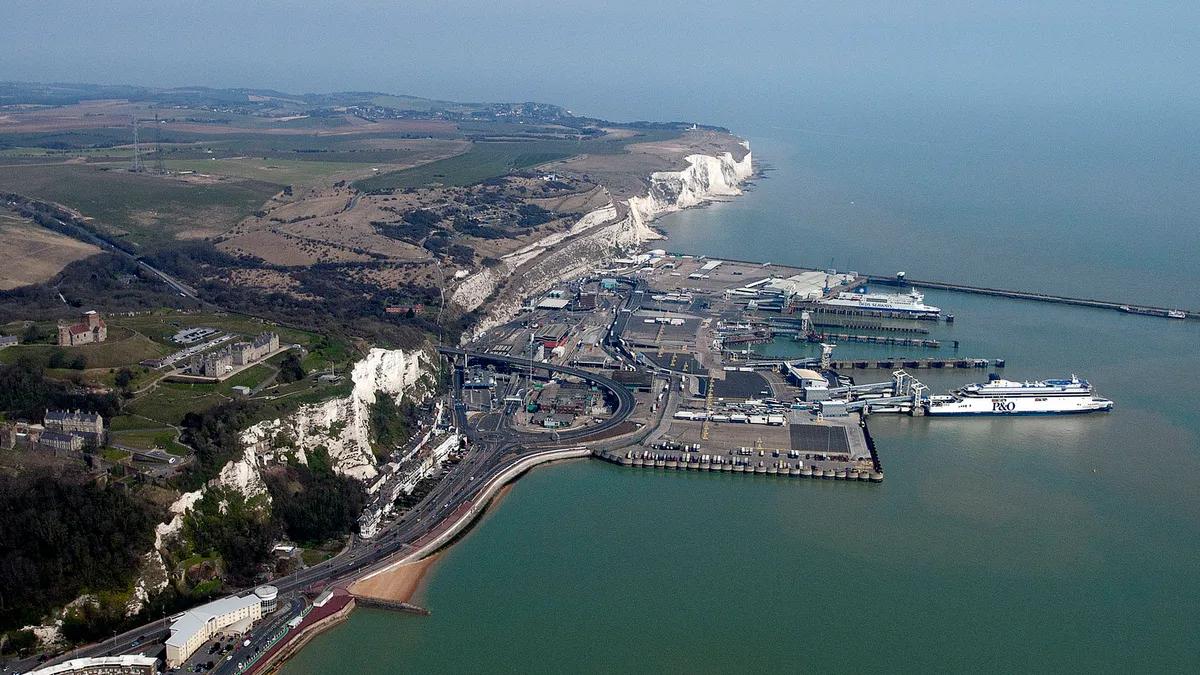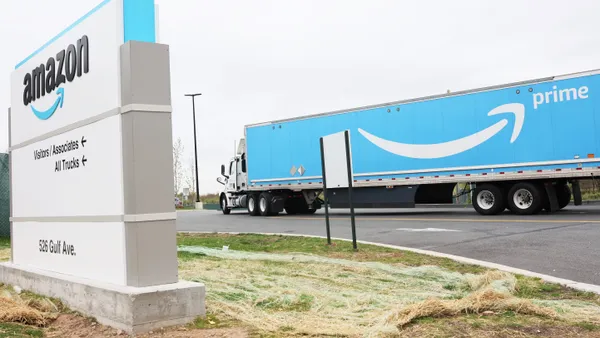Dive Brief:
- The United Kingdom's official transition out of the European Union customs pacts and single market on Jan. 1, 2021 could result in lines of up to 7,000 port-bound trucks trying to cross the English Channel. The backups could result in freight delays upwards of two days, according to a letter the UK government sent to businesses this week outlining a "reasonable worst-case scenario."
- When the current transition period comes to an end all freight will have to meet EU third country control requirements — not previously needed to travel between the UK and EU. The UK government estimates that anywhere from 40% to 70% of trucks traveling to the EU won't be ready the first day after the transition.
- "Disruption could be lower in the initial days of January but we would expect sustained disruption to worsen over the first two weeks as freight demand builds," the letter reads. Disruption could dissipate after the first three months following the transition as fewer unprepared lorries arrive at port facilities.
Dive Insight:
The lack of capacity at French ports to hold noncompliant trucks could reduce the flow of goods to 60% to 80% of normal, according to the letter sent by Michael Gove, the minister in charge of Brexit preparations.
"It is not a prediction, but it is a warning," Gove told lawmakers of the reasonable worst-case scenario.
But industry is still worried that not enough is being done.
"We already know this," Richard Burnett, the chief executive for the Road Haulage Association, said in an emailed statement. "It’s what we've been saying for many months. We know that traders and haulage operators will face new customs controls and processes and we know that if they haven’t completed the right paperwork, their goods will be stopped when entering the EU."
Gove said the goal is to avoid the scenario outlined in the letter sent to businesses. One important part of this preparation is the SMART Freight system, which is meant to ensure trucks have the right documentation. But there are signs the system might not be ready in time for the Jan. 1, 2021 transition, according to The Loadstar, though Gove said the system is in operation and the government is working with businesses to ensure its functioning.
The UK's plan requires UK companies that move goods to or from the EU to have an EORI number for customs purposes. These can be obtained from national customs authorities, according to a report from DHL on how companies can prepare.
Companies have been aware of these rules for months now, Gove told lawmakers Wednesday from the floor of the House of Commons.
"The prospect of 7,000 trucks queuing to cross the Channel sent a chill through my constituents because we know what affect that has on all the roads in Kent," member of Parliament Damian Green said after a presentation by Gove. "It's disastrous."
Concerns around freight flow after the UK's shift out of the EU have been voiced for years now. In 2018, the European Sea Ports Organization said bottlenecks at ports were a legitimate risk following Brexit and urged political leaders to consider supply chains in their planning.
The concerns led to companies — including Amazon and Boeing — stockpiling goods ahead of Brexit votes last year over concerns of a "hard Brexit."
Companies have been given a year transition period to prepare and get the proper documents, but the letter sent to companies this week suggests there could be a significant number of laggards.
"We described last week’s meeting between industry stakeholders and Mr. Gove's team as a total washout," Burnett said. "Government’s promises that Great Britain will be ready for business on 1 January are just a whitewash and right now it appears that UK traders and haulage operators are being left to carry the can."














